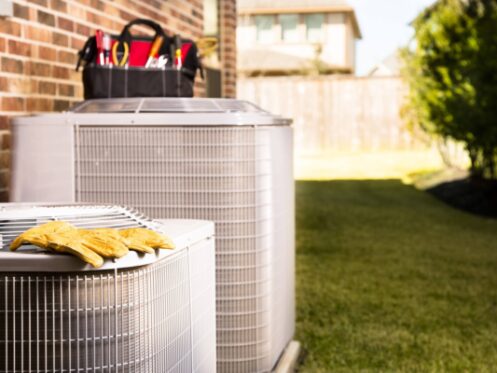Your air conditioner is essential for keeping your home comfortable during warm weather months, but it can also be costly when breakdowns occur. Fortunately, taking proactive measures to maintain your unit now will help eliminate costly repairs down the road. In this blog post, we’ll give you some helpful maintenance tips to ensure your air conditioning system continues running smoothly throughout the summer and beyond. Keep reading to learn how to save money on unexpected repairs while staying cool all year.
1. Change the Filter Regularly
Regularly changing the filter in a central air conditioning system is recommended by HVAC professionals and plays a vital role in preventing costly repairs down the road. A filter in good condition can catch dust and debris before they enter your air conditioner and damage internal components. Clean filters also allow for adequate airflow, so your cooling system does not have to struggle when working to keep your home cool on hot days. Just like how it is difficult to breathe through a straw, air conditioners have to work harder when there is a clogged filter in the system. Making sure filters can do their job by changing them when necessary can extend the life of your air conditioner and may prevent costly repairs. A side benefit is that a system with clean filters is more efficient, so it may cost less to run, putting some money in your pocket.
In addition, while the primary purpose of an HVAC air filter is to protect your equipment, they do function as air scrubbers for the whole system. A filter in bad condition can allow dust, pollutants, and other debris to recirculate through the ducts of your home and, therefore, the whole house. This can lead to you having to clean your home more often and can reduce indoor air quality. Experts recommend changing HVAC filters every three months at a minimum. However, everyone’s home is different, and by regularly inspecting your filters, you can gain a sense of how often they need to be changed out. Factors like the number of pets you own and how many people live in your house can affect how often changing your air conditioner’s air filter is required.
2. Clear Condensate Lines
Clearing condensate lines may be the last thing on your mind when it comes to air conditioner maintenance, but ignoring this critical tip could cost you a lot of money and hassle down the road. The process of cooling your home produces moisture in the air conditioner, which drains into a pan. From there, the condensate line carries the water outside your home.
If the line gets clogged up with dirt, debris, or even algae (especially in humid climates), it can cause a backup in your air conditioner, leading to costly repairs.
If you see water dripping from the condensate line outside your home when the air conditioner is running, you know your unit is functioning properly. Water not draining outside can be a sign that the condensate line is clogged or there is an issue with the drain pain. Other signs to look for to identify condensate line problems include water leaking from your unit, excess humidity in your home, or your air conditioner shutting off and not turning back on. If you notice any of these signs of condensate line blockage, you should contact a professional. A technician can clear the line and may be able to fix any underlying issues that are causing your condensate line to get clogged up. They will also check that the problem is not related to a cracked or damaged drain pain or leaks in the air conditioner’s drainage system.
3. Remove Ice Buildup
Even in hot weather, air conditioners can develop issues with ice build-up. Ice build-up is usually caused by low refrigerant levels or lack of airflow. These issues can cause the coils in the outdoor unit of your air conditioning system to drop below freezing. Humidity in the air then collects on the coils, and the moisture freezes over time, resulting in ice build-up. This situation results in an air conditioner that is operating inefficiently and may experience additional wear and tear as it labors to cool your home. This can cost a homeowner money in repair bills and higher cooling expenses.
If homeowners notice ice in their outdoor unit, the first course of action should be to change the air filter to improve airflow, which may solve the problem. If changing the filter does not work, the problem could be dirty evaporator coils, an air filter that is too restrictive, or return ducks that have become damaged or blocked. A professional will clean the unit, can work with you if there is a return airflow issue, and give you advice on the correct air filter to use with your unit.
4. Monitor Refrigerant Levels
Refrigerant is an important factor in your air conditioner’s proper operation. It gathers the heat energy from your home and transports it outside. Refrigerant lines can develop a leak due to age or if they become damaged. Signs of a leak or low refrigerant levels can include ice build-up, higher utility bills, warm air coming from your vents, and your air conditioner making hissing or gurgling noises.
If you notice any of these signs, you will probably have to contact a professional. A homeowner can not easily check the refrigerant level in their air conditioner. Therefore, it’s essential to have an HVAC expert check the system for leaks, repair any problems, and recharge the refrigerant when necessary. By doing so, you ensure the optimal performance of your cooling system and prevent costly repairs that would otherwise be incurred when a unit breaks down.
5. Check Electrical Connections
This includes inspecting the connection points on your air conditioner’s indoor and outdoor units. Electrical connections can get loose over time, and if not checked, they can lead to severe issues with your system. Loose connections can cause tripped circuit breakers or, even worse, overheating wires that could cause a fire. This type of damage should be avoided at all costs, if you notice any loose, damaged, or frayed wires, it is best to contact a professional. A technician can fix the problem as well as determine if there is a solution for preventing damaged or loose wires in the future.
Rely on the Experts
Regular maintenance is critical to keeping your air conditioner running efficiently and avoiding costly repairs. By following the tips mentioned here, you can extend the useful lifetime of your air conditioning unit. However, there is no substitute for having a professional perform annual preventative maintenance on your cooling system. A technician will clean and lubricate your central air conditioning system and identify small problems that may become major issues in the future. By identifying these small problems and solving them, a professional can help you avoid costly repair costs. The technician will also work with you to ensure your system is as efficient as possible to reduce your cooling bills.
At Level 9 Heating, Cooling, and Plumbing, we have been serving the residents of Washington, MO, since 1975. We install, maintain and repair heating and cooling systems. Additionally, we provide indoor air quality and commercial HVAC services. You may be interested in becoming a member of our Comfort Club maintenance program, which offers discounts to customers on labor and parts costs and includes annual HVAC tune-ups.
If you are having air conditioner issues or have questions about our annual maintenance program, contact [Company_Name] today!



